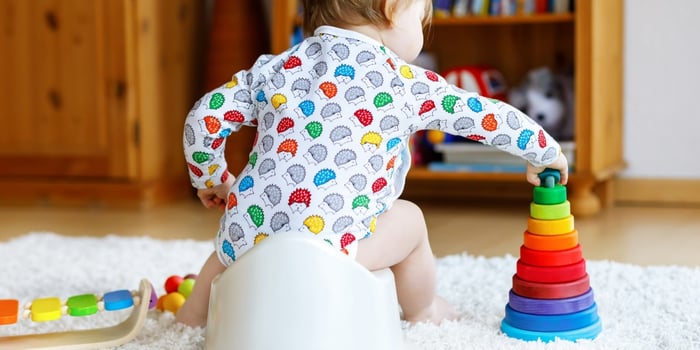Early childhood is full of transitions: starting preschool, ditching the dummies, moving to a toddler bed, but none perhaps is more momentous (or dreaded) than potty training. Finding the right time for potty training can prove something of a challenge, especially when paired with a toddler who doesn’t seem ready or willing to make the transition from nappies to underpants.

Let’s look at a quick run-down of the signs and signals that indicate potty training is a go:
-
Your toddler starts talking about going to the toilet and tells you when their nappy is dirty/asks to be changed.
-
Your toddler seeks out a private place to go to the toilet (especially for a poo). Classic examples are behind the sofa or in a corner. Our toddler’s favourite private place was under the dining table!
-
Your little one shows interest in what you are doing when you are sitting on the toilet.
-
Your toddler takes off their nappy and doesn’t want to put it back on.
-
Nappies stay dry or only slightly used for a long portion of the day before they need changing.
-
Your child is aged between 18 and 32 months.
You may find that your toddler ticks one or all of the boxes above, and if so, it’s time to start that toilet training! What if though, they just don’t want to make the switch? To understand why this refusal may be happening, we need to understand what is going on in the toddler brain.
By the time your child reaches the prime age for potty training (18-32 months), they will have formed quite a strong bond with their nappies. For young children, nappies are like a comfort blanket that they - quite literally - haven’t been without since mere hours after birth.
Taking away this comfort blanket can be scary for a toddler, and without the right preparation can quickly turn disastrous. If the topic of potty training brings about instant tantrums, it doesn’t mean you are doing anything wrong, or that your child isn’t ready, it just means that you need to employ some gentle tactics to help your little one on their way to dry days and nights!
-
Start talking about potty training one to two weeks in advance. This will help to prepare your toddler for the change to come. Make sure you talk with enthusiasm and excitement but remain calm.
-
You can buy underwear in advance but if you follow the ‘Oh Crap! Potty Training’ method as we did, bear in mind that it won’t be worn for the first couple of weeks.
-
Similarly, lots of parents tend to buy flashy or expensive potties when it’s not necessary. You can involve your child in the colour choice if you wish (my son went for prison grey, after his first, frankly hilarious choice of poo brown was not available!). Remember though, this is a toilet, not a place to play, so keep it simple and functional.
-
On the morning of the first day, tell your child in a very matter-of-fact way, that they don’t need to wear nappies any more and they are now going to sit on the potty to go to the toilet. Tell them that they don’t need to worry and that you are going to help them.
-
Throughout the days and weeks that follow, keep open lines of communication with your toddler at all times. Remember that this can be an unnerving time and acknowledge this: “I know this feels strange. It’s ok to be unsure. You are safe. I am right here with you.”
If you can, try not to give up potty training after you have started. This sends mixed messages to your child and is confusing. As a parent, you will have a good idea when the time is right, and along with consulting a list like the one above, you will be able to make an informed decision that is best for your whole family.
Make sure you bear the following in mind when choosing a time to start potty training:
-
Avoid any other big life changes if possible. New siblings, house moves, starting nursery or moving to a toddler bed can all contribute to your toddler feeling overwhelmed if they happen at the same time as toilet training. Try to plan for 8 weeks of breathing space on either side of a major event.
-
Potty training is hard work for the first week or so. It is tiring for you and your toddler, and you really need to make sure you are able to give them your undivided attention. With this in mind, try to arrange childcare for your other children or make sure both parents are at home for at least the first 5 days.
-
Your child will spend a lot of time commando from the waist down in the first week or so. Spring or summer is often a preferred time to potty train because of this. No one wants a cold bottom!
Remember that potty training is a big transition for all of you and it’s ok to feel a sense of nervous anticipation about the process. Like with many big life changes, I found that the waiting and wondering were far worse than the execution. With a little prep and a lot of positive conversation, we found that the whole experience was easier than expected.
If it doesn't go to plan, don’t worry! It’s not your fault. Take a deep breath, regroup and start again, remembering that good communication with your child is pretty much the key to rocking anything and everything toddler-related!
